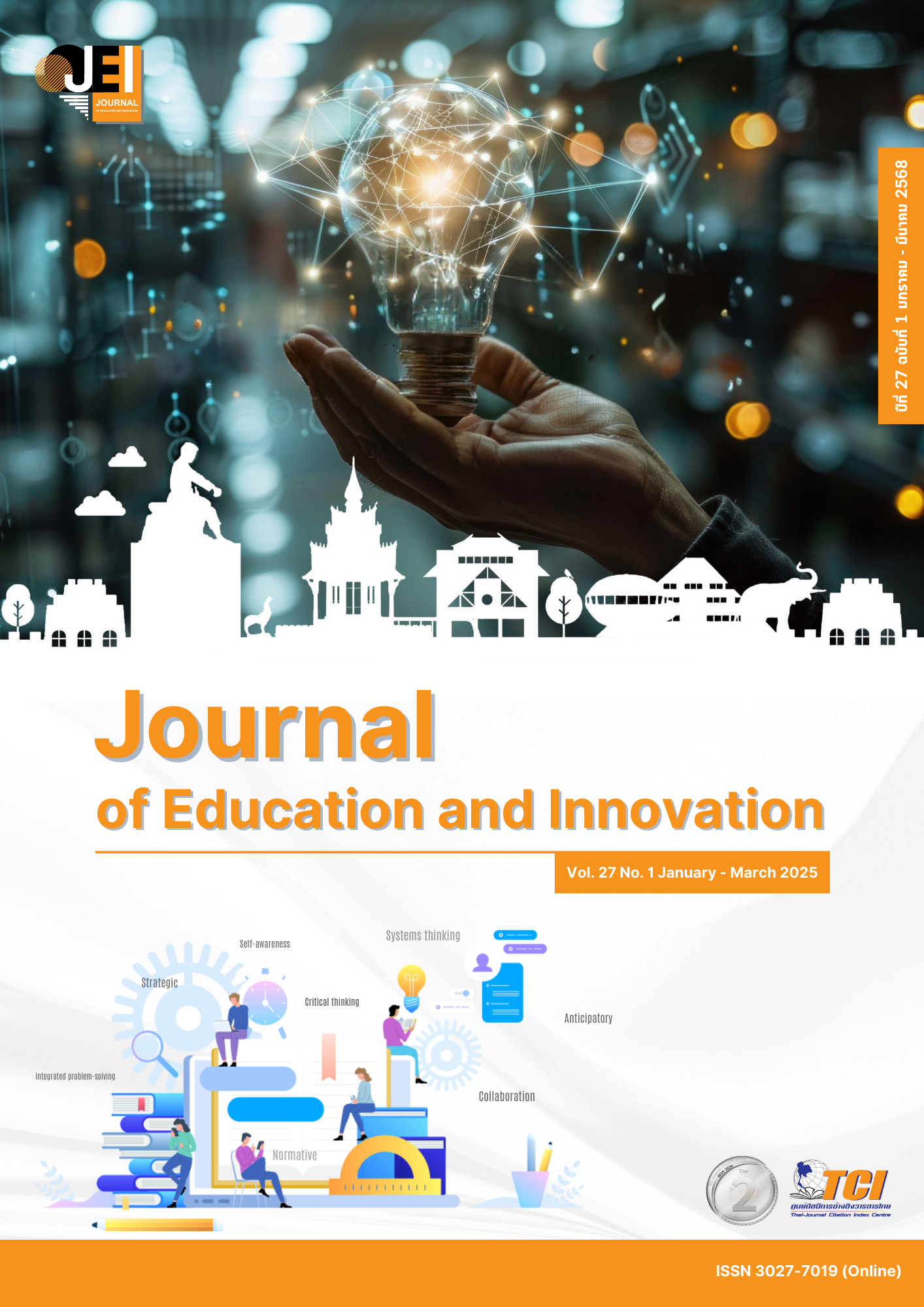THE APPLICATION OF GENERATIVE AI IN EDUCATIONAL RESEARCH: A SYSTEMATIC LITERATURE REVIEW
Main Article Content
Abstract
This study is a systematic literature review with the aim of studying the use of Generative AI in educational research and presenting guidelines for applying AI in the teaching and learning process. The systematic literature review selected 18 articles from foreign research related to the use of Generative AI during 2021-2023. The results show that AI is used in three main ways: supporting learning, creating and improving learning media, and assessing and tracking learning to provide feedback. For example, ChatGPT and ChatBot are used as teaching assistants. Platforms such as Midjourney and Synthesia are used to create interactive learning media. ChatGPT is also used to assess and provide specific feedback to students. The use of AI in education has shown potential to improve learning and teaching experiences. However, there are still challenges in terms of access and equity in education. Therefore, the use of AI should be considered in terms of design that takes into account social factors and access to technology. This is to create more inclusive and equitable education.
Article Details

This work is licensed under a Creative Commons Attribution-NonCommercial-NoDerivatives 4.0 International License.
The owner of the article does not copy or violate any of its copyright. If any copyright infringement occurs or prosecution, in any case, the Editorial Board is not involved in all the rights to the owner of the article to be performed.
References
Abdelghani, R., Wang, Y. H., Yuan, X., Wang, T., Lucas, P., Sauzéon, H., & Oudeyer, P. Y. (2023). GPT-3-Driven Pedagogical Agents to Train Children’s Curious Question-Asking Skills. Journal of Educational Technology, 34(2), 123-137. DOI: 10.1007/s40593-023-00340-7
Acar, S., Berthiaume, K., Grajzel, K., Dumas, D., Flemister, C. T., & Organisciak, P. (2023). Applying Automated Originality Scoring to the Verbal Form of Torrance Tests of Creative Thinking. Gifted Child Quarterly, 67(1), 3-17. DOI: 10.1177/00169862211061874
Álvarez-Álvarez, C., & Falcon, S. (2023). Students' preferences with university teaching practices: analysis of testimonials with artificial intelligence. Educational Technology Research and Development, 71, 1709–1724. DOI: 10.1007/s11423-023-10239-8
Aslan, S., Durham, L. M., Alyuz, N., Chierichetti, R., Denman, P. A., Okur, E., Gonzalez Aguirre, D.I., J. C., Cordourier Maruri, H. A., Sharma, S., Raffa, G., Mayer, R. E., & Nachman, L. (2024). What is the impact of a multi-modal pedagogical conversational AI system on parents' concerns about technology use by young children? The British Journal of Educational Technology, 55(4), 1625-1650. DOI: 10.1111/bjet.13399
Bangkok Post. (2024, 18 Nov). Revolutionising education with AI. Retrieved from https://www.bangkokpost.com/life/social-and-lifestyle/2904007/revolutionising-education-with-ai
Bitzenbauer, P. (2023). ChatGPT in physics education: A pilot study on easy-to-implement activities. Contemporary Educational Technology, 15(3), ep430. DOI: 10.30935/cedtech/13176
Chen, Y., Jensen, S., Albert, L. J., Gupta, S., & Lee, T. (2023). Artificial Intelligence (AI) Student Assistants in the Classroom: Designing Chatbots to Support Student Success. Information Systems Frontiers, 25(1), 161-182. DOI: 10.1007/s10796-022-10291-4
Escalante, J., Pack, A., & Barrett, A. (2023). AI-generated feedback on writing: insights into efficacy and ENL student preference. International Journal of Educational Technology in Higher Education, 20(57). DOI: 10.1186/s41239-023-00425-2
Fernández Herrero, J., Gómez Donoso, F., & Roig Vila, R. (2023). The first steps for adapting an artificial intelligence emotion expression recognition software for emotional management in the educational context. British Journal of Educational Technology, 54(6), 1939-1963. DOI: 10.1111/bjet.13326
Gibson, P. (2023). Enacting Empowerment Through an Automated Teaching Event: A Posthuman and Political Perspective. Postdigital Science and Education, 5, 77–99. DOI: 10.1007/s42438-022-00346-9
Jauhiainen, J. S., & Guerra, A. G. (2023). Generative AI and ChatGPT in School Children’s Education: Evidence from a School Lesson. Sustainability, 15(18), 14025. DOI: 10.3390/su151814025
Nguyen, A., Järvelä, S., Rosé, C., Järvenoja, H., & Malmberg, J. (2023). Examining socially shared regulation and shared physiological arousal events with multimodal learning analytics. The British Journal of Educational Technology, 54(1), 293-312. DOI: 10.1111/bjet.13280
OECD. (2021). Education at a Glance 2021: OECD Indicators. Paris: OECD Publishing.
Pellas, N. (2023). The influence of sociodemographic factors on students' attitudes toward AI-generated video content creation. Smart Learning Environments, 10(57). DOI: 10.1186/s40561-023-00276-4
Perkins, M., Roe, J., Postma, D., McGaughran, J., & Hickerson, D. (2023). Detection of GPT-4 Generated Text in Higher Education: Combining Academic Judgement and Software to Identify Generative AI Tool Misuse. Assessment & Evaluation in Higher Education, 22(1), 89–113. DOI: 10.1007/s10805-023-09492-6
Uddin, S. M., Jamil, A. A., Ovid, A., & Alsharef, A. (2023). Leveraging ChatGPT to Aid Construction Hazard Recognition and Support Safety Education and Training. Sustainability, 15(9), 7121. DOI: 10.3390/su15097121
UNESCO. (2021). AI and education: Guidance for policy-makers. Paris, France: UNESCO.
Vallis, C., Wilson, S., Gozman, D., & Buchanan, J. (2023). Student Perceptions of AI-Generated Avatars in Teaching Business Ethics: We Might not be Impressed. Postdigital Science and Education, 6, 537–555. DOI: 10.1007/s42438-023-00407-7
Vartiainen, H., Tedre, M., & Jormanainen, I. (2023). Co-creating digital art with generative AI in K-9 education: Socio-material insights. International Journal of Education Through Art, 19(3), 405-423. DOI: 10.1386/eta_00143_1
Walters, W. H. (2023). The Effectiveness of Software Designed to Detect AI-Generated Writing: A Comparison of 16 AI Text Detectors. Open Information Science, 7(1), 20220158. DOI: 10.1515/opis-2022-0158
Xia, Q., Chiu, Thomas. K. F., Chai, C. S., & Xie, K. (2023). The mediating effects of needs satisfaction on the relationships between prior knowledge and self-regulated learning through artificial intelligence chatbot. British Journal of Educational Technology, 54(4), 967–986. DOI: 10.1111/bjet.13305


